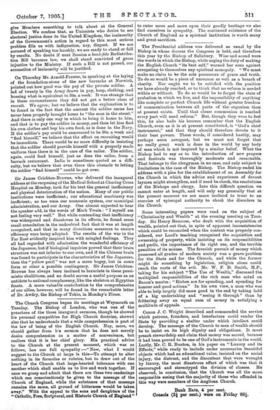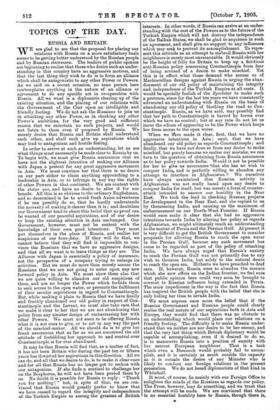Some interesting papers were read on the subject of "Christianity
and Wealth" at the evening meeting on Tues- day. Sir Henry Bemrose, who dealt with the acquisition of wealth, pointed out that, in spite of apparent inconsistencies which could be reconciled when the context was properly con- sidered, our Lord's teaching recognised the acquisition and ownership of property, while insisting on its responsibilities and perils, the importance of its right use, and the terrible penalties of its misuse. The feverish pursuit of money which possessed all grades of modern society was a grave problem for the State and for the Church, and while the former might do something by legislation, religion alone could reach the roots of the evil. Mr. W. F. D. Smith, M.P., taking for his subject "The Use of Wealth," discussed the multiplied responsibilities of the rich man who acted on Bacon's maxim : "Riches are for spending, and spending for honour and good actions." In his own view, a man who was able to help largely did more good in the end by taking hold of a big undertaking and "seeing it through" than by frittering away an equal sum of money in satisfying a multitude of appeals.
Canon J. C. Wright described and commended the service which patrons, founders, and benefactors could render the State by providing a shelter under which intellect could develop. The message of the Church to men of wealth should be to insist on its high dignity and obligations. It must preach stewardship and claim that money was sacred, because it had been proved to be one of God's instruments in the world. Lastly, Mr. C. R. Buxton, in his paper on "Luxury and its Effects," while ready to include under necessaries beautiful objects which had an educational value, insisted on the social injury, the distrust, and the discontent that were wrought by luxury, the most disastrous effect of which was that it encouraged and stereotyped the division of classes. He observed, in conclusion, that the Church was all the more responsible seeing that the majority of those who offended in this way were members of the Anglican Church.
Bank Rate, 4 per cent.
Consols (2i per cent.) were on Friday 88i.
TOPICS OF THE DAY.
RUSSIA AND BRITAIN.
NIVE are glad to see that the proposal for placing our relations with Russia on a more satisfactory basis seems to be getting better understood, by the Russian people and by Russian statesmen. The leaders of public opinion are beginning to realise that those who desire such an under- standing in this country have no aggressive motives, and. that the last thing they wish to do is to form an alliance which shall be antagonistic to any other Power or Powers. As we said on a recent occasion, no sane person here contemplates anything in the nature of an alliance or agreement to do any specific act in co-operation with Russia. All we want is a diplomatic clearing up of the existing situation, and the placing of our relations with the Government of the Czar upon an intelligible and friendly footing. We do not ask the Russians to join us in attacking any other Power, or in checking any other Power's ambitions, for the very good and sufficient reason that we entertain no such projects, and would not listen to them even if proposed by Russia. We merely desire that Russia and Britain shall understand each other, and shall each give up aspirations which may lead to antagonism and hostile feeling.
In order to arrive at such an understanding, let us see what things must necessarily be made clear to Russia by us. To begin with, we must give Russia assurances that we have not the slightest intention of making our Alliance with Japan a pretext for any great aggressive movement in Asia. We must convince her that there is no desire on our part either to claim anything approaching to a leadership in Asia, or to infringe in any way the rights of other Powers in that continent. We are content with the status quo, and have no desire to alter it for our benefit. All this is so obvious to the ordinary Englishman, and so determined is he to avoid fresh Asian adventures if he can possibly do so, that he hardly understands the necessity of making it clearer than it is ; and doubtless our Government tend to share this belief that no proof can be wanted of our peaceful aspirations, and of our desire to keep the existing situation in Asia unchanged. Our Government, however, must not be content with the knowledge of their own good intentions. They must put themselves in the place of Russia, and realise her suspicions of our bona-fides. If they will do that, we cannot believe that they will find it impossible to con- vince the Russians that we have no aggressive designs, and that all we want is to leave things as they are. The Alliance with Japan is essentially a policy of insurance, not the prospectus of a company trying to enlarge its activities. But we must do more than merely assure the Russians that we are not going to enter upon any new forward policy in Asia. We must show them also that we are quite willing to abandon our old suspicions of them, and are no longer the Power which forbids them to seek access to the open water, or prevents the fulfilment of their secular aspirations in regard to Constantinople. But, while making it plain to Russia that we have finally and frankly abandoned our old policy in respect of Con- stantinople and the Levant, we must also take care that we make it clear to her that we are not abandoning that policy from any sinister design of embarrassing her with other Powers. We must not seem to be offering Russia what it is not ours to give, or to act in any way the part of the mischief-maker. All we should do is to give her frank assurances that as far as we are concerned the old attitude of forbidding her approach to and control over Constantinople is for ever abandoned.
It may be that Russia will find that, as a matter of fact, it has not been Britain who during the past ten or fifteen years has thwarted her aspirations in this direction. All we can do, and all that we desire to do, is to make it clear once and for all that Russia has no longer got to reckon with our antagonism. If she finds a sentinel to challenge her on the Bosphorus, he will not have been posted there by us. No doubt it is possible for Russia to reply : "Thank you for nothing ! " but, in spite of that, we are con- vinced that Russia would greatly prefer to know that we have ceased to regard would, integrity and independence of the Turkish Empire as among the greatest of British interests. In other words, if Russia can arrive at an under- standing with the rest of the Powers as to the future of the Turkish Empire which will not destroy the independence of the Balkan States, we shall be glad to acquiesce in such an agreement, and shall give no support to any influences which may seek to prevent its accomplishment. To repre- sent this attitude as an attempt to embroil Russia with her neighbours is surely most unreasonable. It would obviously be the height of folly for Britain to keep up a fictitious anti-Russian policy concerning Constantinople from fear of being accused of a desire to make mischief. Yet this is in effect what those demand who accuse us of Machiavellian designs against Russia in urging the aban- donment of our old policy of maintaining the integrity and independence of the Turkish Empire at all costs. It would be specially foolish of the Spectator to make such a pretence, since for the last ten years we have consistently advocated an understanding with Russia on the basis of abandoning our old policy of blocking the road to Con- stantinople. Russia, as we have said, may possibly find that her path to Constantinople is barred by forces over which we have no control ; but at any rate do not let us incur the odium of appearing to be the Power which keeps her from access to the open water.



























































 Previous page
Previous page